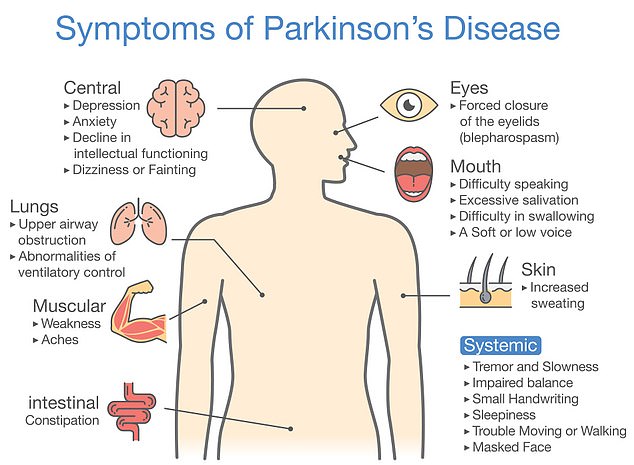What is Parkinson’s disease and what are the symptoms?
Democratic Congresswoman Jennifer Wexton has revealed she has been diagnosed with Parkinson’s disease.
The 54-year-old mother of two who serves Virginia’s 10th congressional district released a video Tuesday morning in which she says it “sucks” but vowed to continue serving in Congress.
Parkinson’s is the fastest growing neurological disorder in the world and there is currently no cure. However, knowing Parkinson’s symptoms can lead to earlier diagnoses and access to treatments that improve patients’ quality of life.
About 90,000 Americans and 18,000 Britons are diagnosed each year, and charities estimate that one in 37 people alive today will be diagnosed in their lifetime.
Here DailyMail.com reveals some warning signs of the crippling disease:
Knowing Parkinson’s symptoms can lead to earlier diagnoses and access to treatments that improve patients’ quality of life

Wexton is pictured above with her family
Tremors
A tremor or uncontrollable movement is one of the most well-known symptoms of Parkinson’s and may be the very first symptom to appear.
It usually starts in the hand before spreading to the rest of the arm, or sometimes to the foot on the same side of the body, charities say.
Tremors are more likely to occur when the limbs are relaxed.
While there is no cure for tremors, it can be treated with the help of a specialist or Parkinson’s nurse.
Parkinson’s is caused by the death of nerve cells in a part of the brain called the substantia nigra, which is responsible for producing dopamine.
Dopamine is a vital neurotransmitter that acts as a messenger between the parts of the brain and nervous system that help control and coordinate body movements.
It is a lack of this chemical that causes tremors and a range of other Parkinson’s symptoms.
Slow movements
Daily tasks can take much longer if you have Parkinson’s.
As a result, everyday activities such as paying for items in a shop, buttoning up buttons and walking to the bus can take more time, says Parkinson’s UK.

Parkinson’s can cause symptoms related to movement, as well as pain, depression and loss of smell, experts say

Wexton envisioned being sworn into Congress in 2019
Slowness of movement, known medically as bradykinesia, involves walking with short, shuffling steps.
It can also lead to smaller movements – such as not smiling as broadly as usual – difficulty swallowing and chewing and a lack of coordination.
Slow movement is also caused by decreased dopamine levels in the brain, which affects the way the muscles work.
Muscle stiffness
Stiff muscles are another Parkinson’s symptom that can slow you down.
Tension and a lack of flexibility in the muscles can make it difficult to make facial expressions and move.
This can lead to painful muscle spasms and balance problems.
Swinging the arms, getting up from a chair, and turning over in bed can all become more difficult as a result, as can breathing and speaking clearly.
Just as decreased dopamine levels can cause slow movements and tremors, it’s also thought to disrupt the balance between the muscles that stretch and relax for each movement, leading to stiffness and stiffness, according to Parkinson’s Europe.
Loss of smell
The loss of your sense of smell is an early warning sign of Parkinson’s disease.
This symptom affects 95 percent of those with the condition and can start years before other symptoms appear, says Parkinson’s UK.
But loss of smell can affect people in different ways, with some losing or gaining weight because they can no longer smell food, while it can affect the mood of others.
For some, it can be subtle and only muffle their scent, while others struggle to smell.
It can also lead to safety concerns, with patients having difficulty smelling burning, for example.
Research suggests that the symptoms are caused by a part of the brain known as the ‘olfactory bulb’ and responsible for processing smells, as it is smaller in some people with Parkinson’s, according to Parkinson’s UK.
Studies have also shown that this bulb is the first part of the body to see a buildup of alpha-synuclein – a protein found in dopamine-producing cells.
In Parkinson’s patients, the proteins become entangled and form clumps, which experts believe can spread the disease throughout the brain.
Bladder or bowel problems
Getting up at night to go to the toilet can plague many people as they get older.
But it’s also another early sign of Parkinson’s.
Going to the bathroom more than once or twice a night — known medically as nocturia — can be a sign of the disease.
Urge incontinence, needing to urinate immediately and difficulty ‘holding in’ can also be a symptom.
In Parkinson’s, the symptoms are due to drops and fluctuations in dopamine levels, as this can affect the functioning of the bladder muscles and nerves.
The loss of dopamine can also cause the brain signals that tell the bladder to hold or expel urine to become disrupted, according to Parkinson’s Europe.
Constipation is also a symptom of the disease, as slowness of movement and stiffness — telltale signs of the condition — can affect the muscles in the intestinal wall.
Depression and anxiety
Feelings of extreme sadness over a long period of time can be a sign of depression.
Depression and anxiety are common in people with Parkinson’s, but it’s not entirely clear why, according to the NHS.
In some cases, these feelings occur months before other symptoms are revealed.
Studies suggest that the symptoms are due to the decrease in dopamine in Parkinson’s patients, which can lead to fatigue and low mood.
Parkinson’s UK says this can cause depression, worry and anxiety.
In addition, some patients may find that they are unable to socialize as much as they used to, leading to loneliness and isolation, increasing the risk of depression.
But the charity also notes that being diagnosed with Parkinson’s itself can be very stressful, so it’s understandable that you might experience these feelings.
